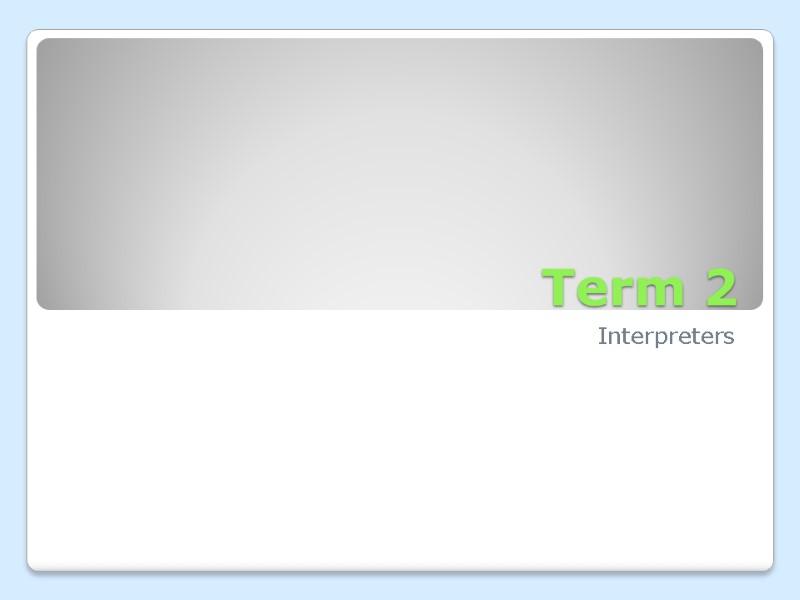 Term 2 Interpreters
Term 2 Interpreters
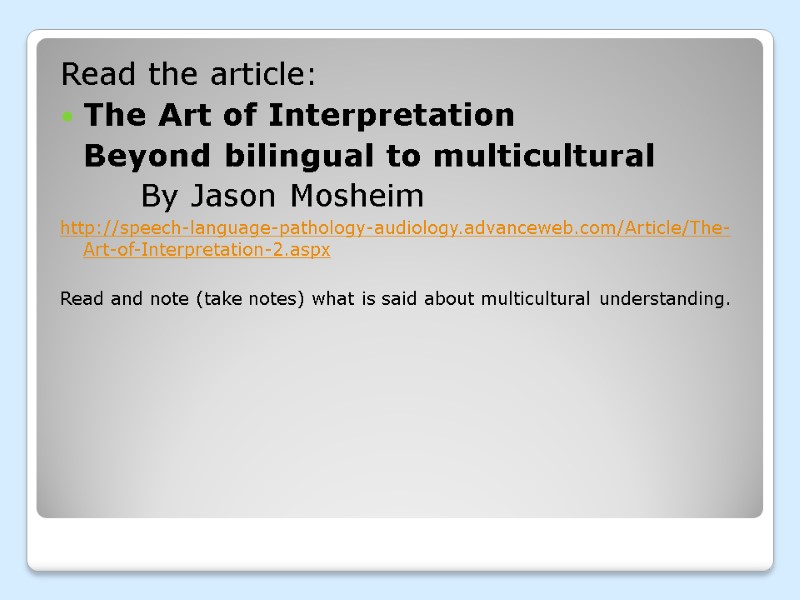 Read the article: The Art of Interpretation Beyond bilingual to multicultural By Jason Mosheim http://speech-language-pathology-audiology.advanceweb.com/Article/The-Art-of-Interpretation-2.aspx Read and note (take notes) what is said about multicultural understanding.
Read the article: The Art of Interpretation Beyond bilingual to multicultural By Jason Mosheim http://speech-language-pathology-audiology.advanceweb.com/Article/The-Art-of-Interpretation-2.aspx Read and note (take notes) what is said about multicultural understanding.
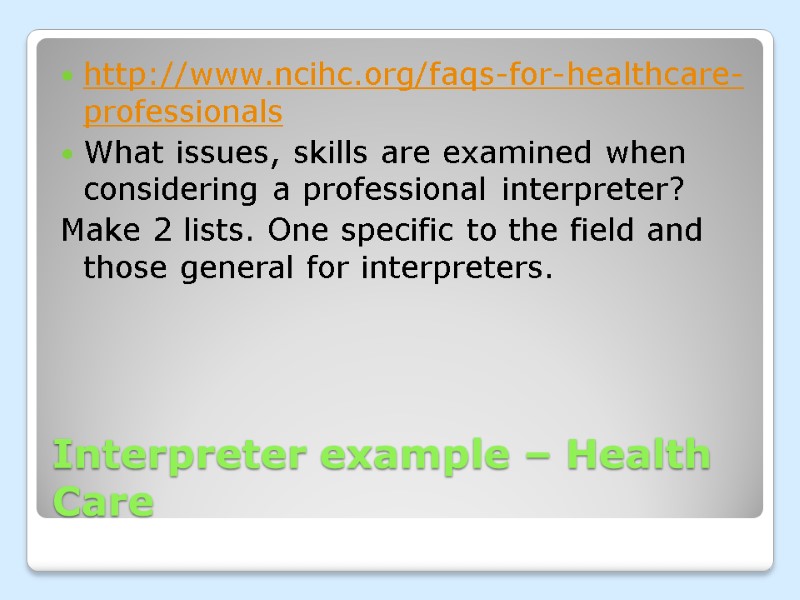 Interpreter example – Health Care http://www.ncihc.org/faqs-for-healthcare-professionals What issues, skills are examined when considering a professional interpreter? Make 2 lists. One specific to the field and those general for interpreters.
Interpreter example – Health Care http://www.ncihc.org/faqs-for-healthcare-professionals What issues, skills are examined when considering a professional interpreter? Make 2 lists. One specific to the field and those general for interpreters.
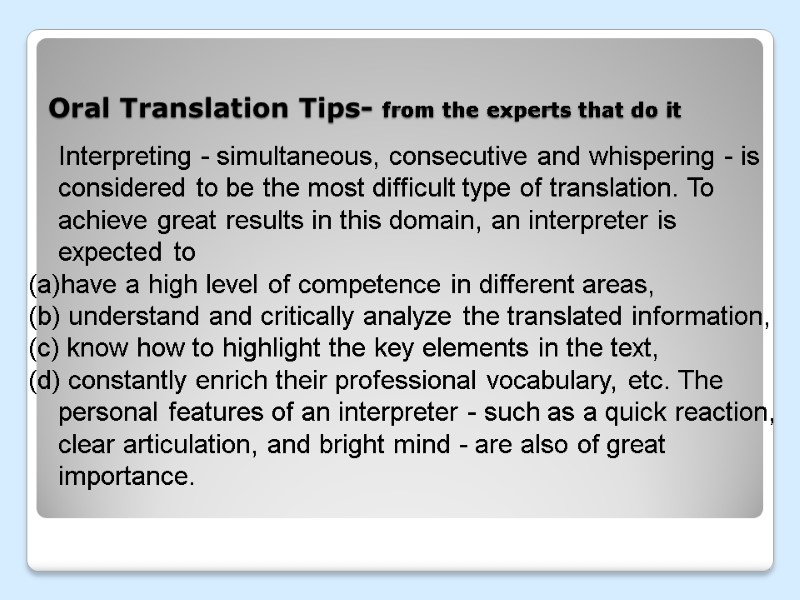 Oral Translation Tips- from the experts that do it Interpreting - simultaneous, consecutive and whispering - is considered to be the most difficult type of translation. To achieve great results in this domain, an interpreter is expected to have a high level of competence in different areas, (b) understand and critically analyze the translated information, (c) know how to highlight the key elements in the text, (d) constantly enrich their professional vocabulary, etc. The personal features of an interpreter - such as a quick reaction, clear articulation, and bright mind - are also of great importance.
Oral Translation Tips- from the experts that do it Interpreting - simultaneous, consecutive and whispering - is considered to be the most difficult type of translation. To achieve great results in this domain, an interpreter is expected to have a high level of competence in different areas, (b) understand and critically analyze the translated information, (c) know how to highlight the key elements in the text, (d) constantly enrich their professional vocabulary, etc. The personal features of an interpreter - such as a quick reaction, clear articulation, and bright mind - are also of great importance.
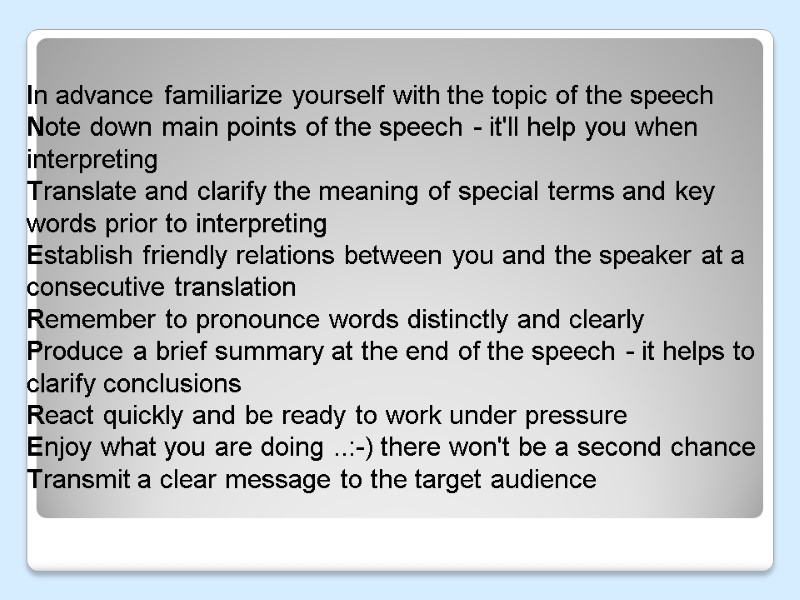 In advance familiarize yourself with the topic of the speech Note down main points of the speech - it'll help you when interpreting Translate and clarify the meaning of special terms and key words prior to interpreting Establish friendly relations between you and the speaker at a consecutive translation Remember to pronounce words distinctly and clearly Produce a brief summary at the end of the speech - it helps to clarify conclusions React quickly and be ready to work under pressure Enjoy what you are doing ..:-) there won't be a second chance Transmit a clear message to the target audience
In advance familiarize yourself with the topic of the speech Note down main points of the speech - it'll help you when interpreting Translate and clarify the meaning of special terms and key words prior to interpreting Establish friendly relations between you and the speaker at a consecutive translation Remember to pronounce words distinctly and clearly Produce a brief summary at the end of the speech - it helps to clarify conclusions React quickly and be ready to work under pressure Enjoy what you are doing ..:-) there won't be a second chance Transmit a clear message to the target audience
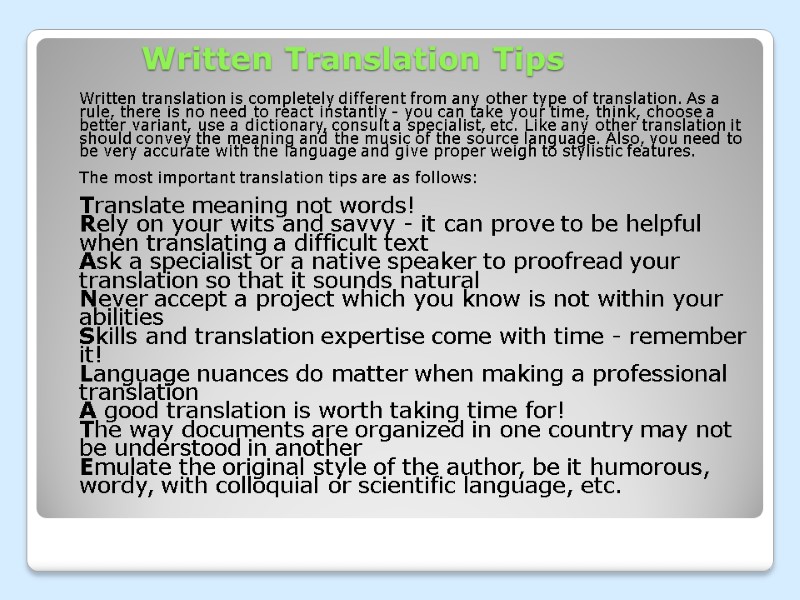 Written Translation Tips Written translation is completely different from any other type of translation. As a rule, there is no need to react instantly - you can take your time, think, choose a better variant, use a dictionary, consult a specialist, etc. Like any other translation it should convey the meaning and the music of the source language. Also, you need to be very accurate with the language and give proper weigh to stylistic features. The most important translation tips are as follows: Translate meaning not words! Rely on your wits and savvy - it can prove to be helpful when translating a difficult text Ask a specialist or a native speaker to proofread your translation so that it sounds natural Never accept a project which you know is not within your abilities Skills and translation expertise come with time - remember it! Language nuances do matter when making a professional translation A good translation is worth taking time for! The way documents are organized in one country may not be understood in another Emulate the original style of the author, be it humorous, wordy, with colloquial or scientific language, etc.
Written Translation Tips Written translation is completely different from any other type of translation. As a rule, there is no need to react instantly - you can take your time, think, choose a better variant, use a dictionary, consult a specialist, etc. Like any other translation it should convey the meaning and the music of the source language. Also, you need to be very accurate with the language and give proper weigh to stylistic features. The most important translation tips are as follows: Translate meaning not words! Rely on your wits and savvy - it can prove to be helpful when translating a difficult text Ask a specialist or a native speaker to proofread your translation so that it sounds natural Never accept a project which you know is not within your abilities Skills and translation expertise come with time - remember it! Language nuances do matter when making a professional translation A good translation is worth taking time for! The way documents are organized in one country may not be understood in another Emulate the original style of the author, be it humorous, wordy, with colloquial or scientific language, etc.
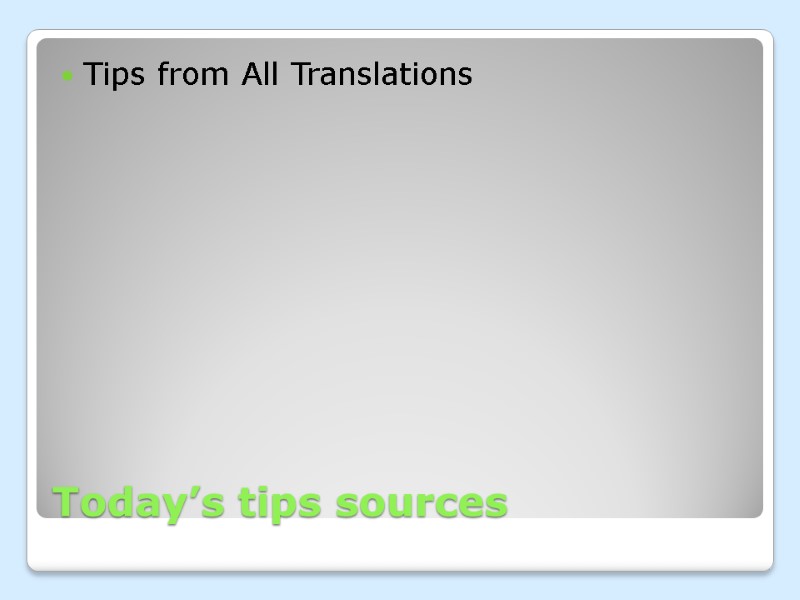 Today’s tips sources Tips from All Translations
Today’s tips sources Tips from All Translations















